Magic the Gathering is a game I played a lot before I started this blog so I haven’t given it the attention it deserves.
Now is the time…
You play the role of a planeswalker—a powerful wizard who fights other planeswalkers for glory, knowledge, and conquest. Your deck of cards represents all the weapons in your arsenal. It contains the spells you know and the creatures you can summon to fight for you.
Magic the Gathering Game Play
So I played on and off from around 1994 to around 2012 so I’m a bit out of the loop now. But here is a loose look at the basics of how you play. I’m not going too in-depth either!
This is a 1v1 game where each player has 20 life with the goal to reduce it to zero or empty the opponent’s deck.
Players will bring their own deck of at least 60 cards made up however they like. You can’t have more than 4 copies of a single card.
Players take turns playing over 7 phases:
Untap
To activate a card you will tap it which is just turning it 90 degrees. You start your turn by straightening it all up so they are ready to play again.
Upkeep
This is a special phase of the game and quite an important one. Usually, cards will activate here that you played in earlier turns.
Quite often you have the option to pay the upkeep cost of a card to keep it in play or discard it.
Draw
Draw a card… Just one.
Main Phase 1
As suggested this is the main phase of the game where spells are played. Each turn you are allowed to play 1 land card from your hand into play. Lands, when tapped, give you mana of a certain colour which you then spend to cast spells.
Swamps, Mountains, Forests, Plains and Islands produce Black, Red, Green, White and Blue mana respectively.
Spells have a cost usually a mix of coloured and colourless mana. So if a spell has a cost of 1 white mana and 3 colourless (as Armageddon below does) you would need to generate 4 mana in total and at least 1 must be white.
On top of lands, there are 6 types of cards so let’s look at each one and what it does.
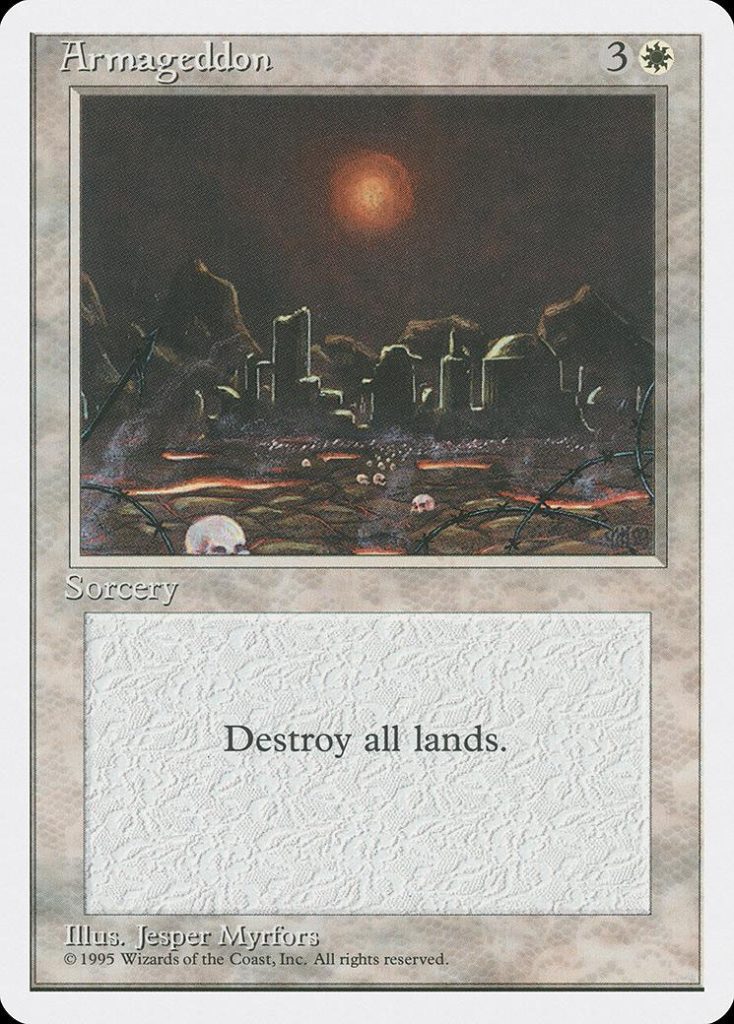
Sorcery – These can only be played on your turn in your main phase. Simply cast, resolve and discard.
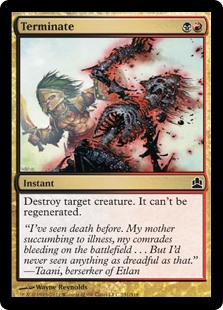
Instant – Cast, resolve and discard like a Sorcery, but these can be played at any time, even on your opponents turn.
The rest of the cards, including lands, can only be played when you could play a Sorcery making the main phase VERY important.
Permanents
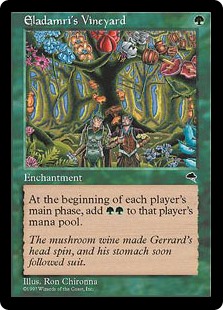
Enchantment – These are spells that stay in play. Global enchantments affect the whole game. Some attach to creatures (Called Auras) and effect that creature only and when that creature dies the aura goes with it.
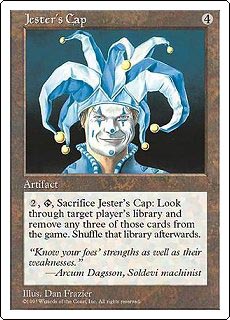
Artifact – They work in a similar way to a global enchantment but are generally colourless.
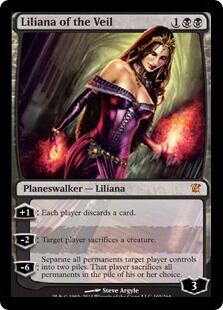
Planeswalker – A unique card type that came in towards the end of my regular playing of the game. They come into play with a number of loyalty tokens on them shown in the bottom right. Once per turn, you can add or remove the shown number of tokens to activate one of their abilities.
Damage dealt to a Planeswalker will remove that many loyalty tokens and if they are all removed, the card is discarded.
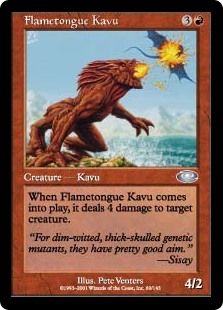
Creature – These stay in play until removed. They have a power and toughness usually represented like this: 4/2. So in this case, the creature has 4 power and 2 toughness.
Creatures also have summoning sickness. The turn they come into play, they can not activate any abilities or attack, speaking of which…
Combat
The active player chooses any number of their creatures and taps them to declare they are attacking. The defending player assigns their creatures to block them. Once done, those creatures deal damage to each other.
If a 2/2 creature blocks a 1/1 creature:
The 1/1 will deal 1 damage to the 2/2, but as the 2/2 has 2 defence they will survive.
The 2/2 will deal 2 damage to the 1/1, as they are taking 2 damage and only have 1 defence they are killed and sent to the discard pile.
Main Phase 2
The same as Main Phase 1, a chance to play more spells.
Clean-up Step
Some effects will activate or end in the end step. Also, all damage is removed from creatures and also the active player will need to discard down to 7 cards.
The next player takes their turn and this goes back and forth until an end game condition is met.
Theme
I mean, the theme is OK. I know the world has a rich backstory but I haven’t really cared about it since Tempest.
However, you do feel like 2 mages fighting which is cool.
Setup & Rulebook
Normally here I’d just say build a deck, shuffle, draw 7 and you’re done. But man, building a deck is fun. Reading spoiler lists and plotting a deck out then buying and trading to get the cards and testing and refining…
But yeah, once you have a deck you just shuffle it and draw 7.
I can honestly say I’ve never read the rulebook, except to check what happens when you block a creature with Trample with one with Protection from that colour ’cause I always forget what happens.
Components & Artwork
Now I mentioned I’m out the loop with the game but it’s an interesting situation for MTG. The card quality is out of date but they couldn’t change them or they’ll feel different. But, I believe they did in 2018/19 and apparently, they feel better.
The game uses 100’s of artists so every card is different. You’ll find something in your style.
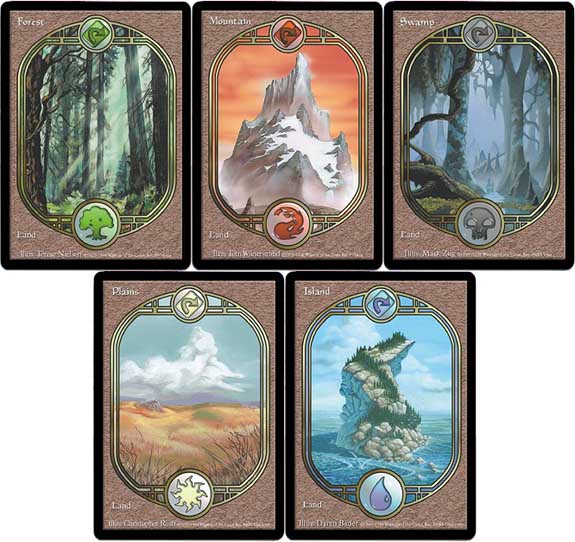
Ease of Teaching
Bloody hell…
I’m fortunate to have never, ever had to teach this game from scratch. I have no idea where to start. I would probably get people to play the digital game online and learn that way 🙂
Magic the Gathering Summary
So there are two very different settings that I enjoy playing this game in.
I used to play at friends houses or at the pub casually playing 5 corners or attack left. These were a good way to play really weird or silly decks. One issue here is multiplayer games are usually slower so you end up using decks too slow for a 1 on 1 game. Not a good time to test, but good fun non the less.
The other time is casual tournaments. I’ve played in PTQs etc and they’re OK but far too serious for me. I like weekly tournaments that are friendly with less on the line. Where you can openly discuss your deck after a game and look for improvements. They’re good fun.
Also, competitive tournament play is very repetitive. There are the current ‘best decks’ and quite often you’ll play against the same boring deck that everyone has copied from the internet. The last tournament I went to I played 5 games and 4 of those players had the exact same deck.
I get it, they want to win but for me, it wasn’t fun. Especially when that was a £400+ deck and its goal was to stop you playing any cards…
How much?!
That’s the thing about the game is the cost. Yes, you can play spending VERY little money but I’m so used to playing with the exact 60 cards I want in a deck I wouldn’t be happy playing anything less.
I could spend £80 on 4 copies of that card I need but that’s 2 decent board games or 1 new PS5 game plus change. Lifes priorities get in the way.
The customisation and deck building of the game is really fun, and I do miss it. But it is a lifestyle game, and as I’ve mentioned, it’s really expensive to play at the level I want to, I just can’t right now.
But casually, this is one of the best games of all time.
How to Get Started in Magic the Gathering
Note: I wrote this originally in 2011 and updated it regularly until July 2019. It’s still relevant though so give it a read.
Magic the Gathering is bloody expensive. If you’re just getting started in tournament play, it can get very expensive very quickly.
Here are a few tips to help you get started in Magic the Gathering without spending £100’s.
I also have a few survival tips 🙂
Magic the Gathering is in my Board Game Hall of Fame
1. Find your nearest Magic the Gathering G roup
I admit, I haven’t played magic for a while and I haven’t played Tournament Magic for AGES.
So check Facebook, Meetup, Board Game Shops etc to look for a group near you. There are no more knowledgeable people than those that actively play the game.
There is a ‘stigma’ around Magic the Gathering players being unsociable but tournament/group organisers or shop owners generally are pretty good.
2. Check Card Legality
Not every card is legal for every tournament so check which cards are legal for Standard play.
Cards from other/older sets are a waste of money if you intend to play Standard (which is the most common tournament format.)
You could push this a step further and look at which sets rotate out next and give them a miss for now. Plan for the future!
3. Pick a Colour or Style
How do you play? Do you like to play big green stompy creatures? or are you like me and prefer small white weenie creatures? Counterspells? Removal? Burn?
There are many apps and video games available for you to test various ways to play and see which you enjoy.
MTG Arena is a great way to test what you like (As well as learn the rules)
Deciding which strategy will usually define the choice of colour you will play which could remove up to 80% of the potential card pool. That drastically reduces wasted cost.
5. Buy a Magic the Gathering Event Deck or Intro Pack
Event Decks contain a fully complete deck ready to play. These are not terrible decks either, you can win with them.
If an Event Deck matches your strategy and Colour choice then pick one up and add to it with other cards. This is a great way to pick up a decent tournament deck very very cheaply.
Intro Packs are pre-constructed decks but are often not as powerful as a fully formed deck you build yourself, but they’re a good start!
6. Buy a Magic the Gathering Fat Pack
A Fat Pack contains loads of boosters and lands. They’re random so it’s more of a ‘hit and hope’ approach. An Event Deck + a Fat Pack is not a bad idea at all.
Some give you extra land which means you can build a couple of different decks and play with friends outside of local groups. (Nothing wrong with getting a bit of practice!)
7. Buy Common and Uncommon Sets
Some online traders offer 4 of each common and uncommon card from a set for around £30-40. This is a very good way to get most of the cards you need to build decks or to flush out your collection.
Pre-ordering these also means you get powerful commons and
These sets combined with the Event Deck of your choice can give you a very cheap and easy way to make a fairly good deck.
8. Survival Tips!
- Buy deck protectors to keep your cards in mint condition (Helps keep their value)
- Put your spare cards in a folder (For the same reason)
- Buy a dice to track your life total, Fat Packs often come with a life counter (Or just get beads, pen + paper etc)
- As in life, most people are nice but some are not, be aware of cheats
- Also, look for people who trade cards unfairly (Never be afraid to ask for a 2nd opinion)
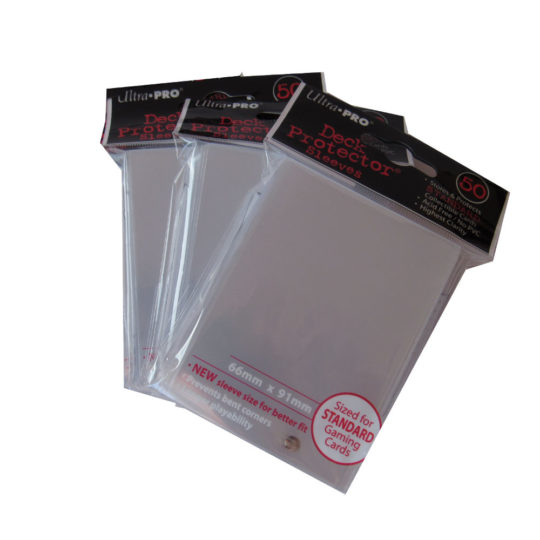
9. Just Lose
Lastly and most importantly. Be prepared to lose. Your £20 event deck might be good, but you will be playing people that have decks worth £300+ and have been playing for years…
What you can do is learn from any mistakes you made, learn from cards in your deck that weren’t very good, look for cards you don’t own that you could have used.
Ask your opponent what they thought of your deck after the game, most people are willing to help. (Most Magic players are VERY opinionated! :))
Feel free to add to their advice or ask any questions 🙂
Oh, and remember to have fun!
Jesta ThaRogue
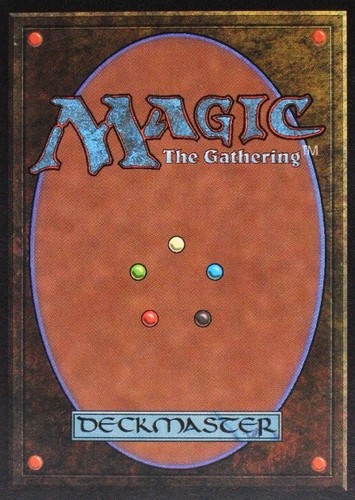


Leave a Reply